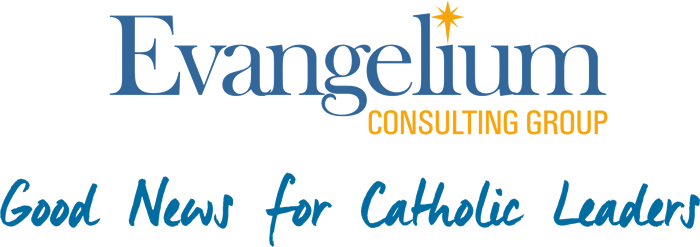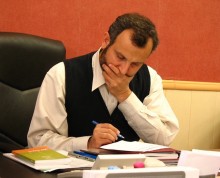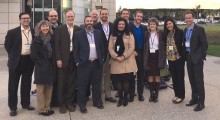Like all the other Apple fans and tech nerds, I briefly tuned into Apple’s Special Event recently. I admit I really enjoyed their introductory spoof using a Mission: Impossible theme. Very clever.
This reminded me of a story involving Archbishop Allen Vigneron (then Bishop of Oakland, CA, now Archbishop of Detroit), when he and I worked together in Oakland. I was the Director of a large department charged with evangelization and catechesis.
One early morning at the chancery, Bishop came to my office to discuss something. During our conversation, my iPhone rang, revealing my ringtone, which was the theme song from the Mission: Impossible movies.
Bishop stopped talking while I silenced my phone and said, “that’s a very interesting ring on your phone.”
“Yes, it’s from Mission: Impossible,” I told him.
No reaction from Bishop. He didn’t seem to know what that was. “The Mission: Impossible movies. You know, starring Tom Cruise.”
Still no reaction.
“You see Bishop,” I started to explain, “I have this ringtone on my phone because our work here at the Diocese sometimes feels like an impossible mission; that some days it’s just impossible to get stuff done.”
He gave me a puzzled look and I wondered if he thought that I was just being fatalistic and already admitting defeat in our task to evangelize the Bay Area.
“They always win in the end,” I told him.
“Excuse me?” the Bishop asked in a clarifying way.
“In the movies, Mission: Impossible; they always win in the end…and so will we.” I told him, trying to tie together this awkward conversation, and kind of wishing I had chosen a different ring tone.
“Mm,” he said with a nod of his head and a grin. He seemed to indicate he understood what I was explaining, but then I wondered how this can make any sense if you’ve never seen the movies.
I tell this story because I think it relates to the subject of Organizational Health. Much like the Mission: Impossible movies were then to Archbishop Vigneron, organizational health is still largely unknown and unexperienced in the wider U.S. Catholic Church. Of course, if you’ve been paying attention, you’ll see this method used in the Amazing Parish movement as Patrick Lencioni, the method’s creator, has already spoken to thousands of participants about the merits of having a leadership team and creating clarity.
In fact, Archbishop Vigneron knows full well about the merits of organizational health. In his own Pastoral Letter, Unleash the Gospel, he tasks leaders with “developing standards and norms for organizational health” and asks that they “lead the creation of coaching teams” to assist with this development. Great idea.
So what is organizational health and why is it still so foreign in the Church today? Organizational health is about helping any Catholic leadership teams function more effectively by doing four simple things: (1) Build and maintain a cohesive leadership team, (2) Establish real clarity, (3) Over-communicate that clarity, and (4) Reinforce that clarity.
Let’s break apart those four disciplines, in what we call a “Catholicized” Lencioni methodology:
-
Build and maintain a spiritually and behaviorally cohesive leadership team whereby teammates are deeply unified in their spirituality and prayer and five other behaviors (trust, conflict, commitment, accountability, and results). Each of these relies on the former to be effective.
-
Establish real clarity by answering seven critical questions involving your purpose, strategy, goals and objectives, and performance. This is not “corporate talk” because the first clarity question is about how you discern God’s will and how you get others to pray for your important work.
-
Over-communicate that clarity throughout the entire organization, so that the people at every level – gardeners, admins, ushers, or the bishop of a diocese – all know, can repeatedly communicate, and contribute to your Catholic organization’s core purpose, values, and strategy.
-
Reinforce that clarity through the human systems of your organization. How you hire, fire, and reward employees and/or volunteers, all depends on who you are and what you do.
This model of organizational health also includes a revolutionary method on how to do meetings by first breaking meetings into four distinct modalities: Daily, Weekly, Monthly, and Quarterly, each with a very specific type of content and time frames, as their names suggest. But more importantly, the method presents a way to engage in good healthy conflict, talk about what matters most, and make critical and timely decisions and actions. Best of all, you’ll have fun doing it.
It’s that last part, “fun and effective meetings,” that seems like Mission: Impossible to most Catholic leaders, mostly because meetings have come to be known as dedicated penance, something akin to slogging through a swamp.
Therein lies why organizational health is still so foreign in the Church today: change, even positive change, is difficult, especially in an institution that’s been around for over 2,000 years. Many leaders make a false presumption that we really cannot change the way things are, that people in leadership will remain detached and aloof, that team members won’t say what they really think and feel to each other, and that politics and confusion are just the norm.
But here’s the thing: you don’t need Tom Cruise, an array of cool spy tech, or a new Apple Watch to make your Catholic organization healthy and great; the process is much simpler, and there are lots of tools available to you right now. I recommend the following:
-
Head over to the Amazing Parish resource page where you can find lots of free videos and webinars, even if your organization is not a parish.
-
Read any of Patrick Lencioni’s books (The Five Dysfunctions of a Team, The Better Pastor, or The Advantage) and put these simple principles into practice.
-
Take this free online Meetings Quiz located on the Table Group’s webpage (Patrick Lencioni’s consulting firm) to see whether or not you’ve mastered the art of meetings. They have lots of other free tools to help teams there as well.
-
Contact a Catholic consulting firm or individual who can come personally work with your leadership team in the area of organizational health. Feel free to contact us and we would be happy to connect you with a group like this, even if it’s not us.
By the way, did you happen to notice Jeff Williams, the Chief Operating Officer at Apple, while he was announcing the new features on the Apple Watch Series 4, say that our consulting firm, ECG, is #1 (see picture above). We appreciate that Jeff! And people thought he was talking about the new electrocardiogram feature, sheesh.
Your mission, if you decide to accept it: get organizationally healthy! This article will self-destruct in five seconds…
(In case you don’t know, that last part is from the Mission: Impossible movies. They always win in the end!)
Keith Borchers, Founder and President of Evangelium Consulting Group, writes from his office in the San Francisco Bay Area.















